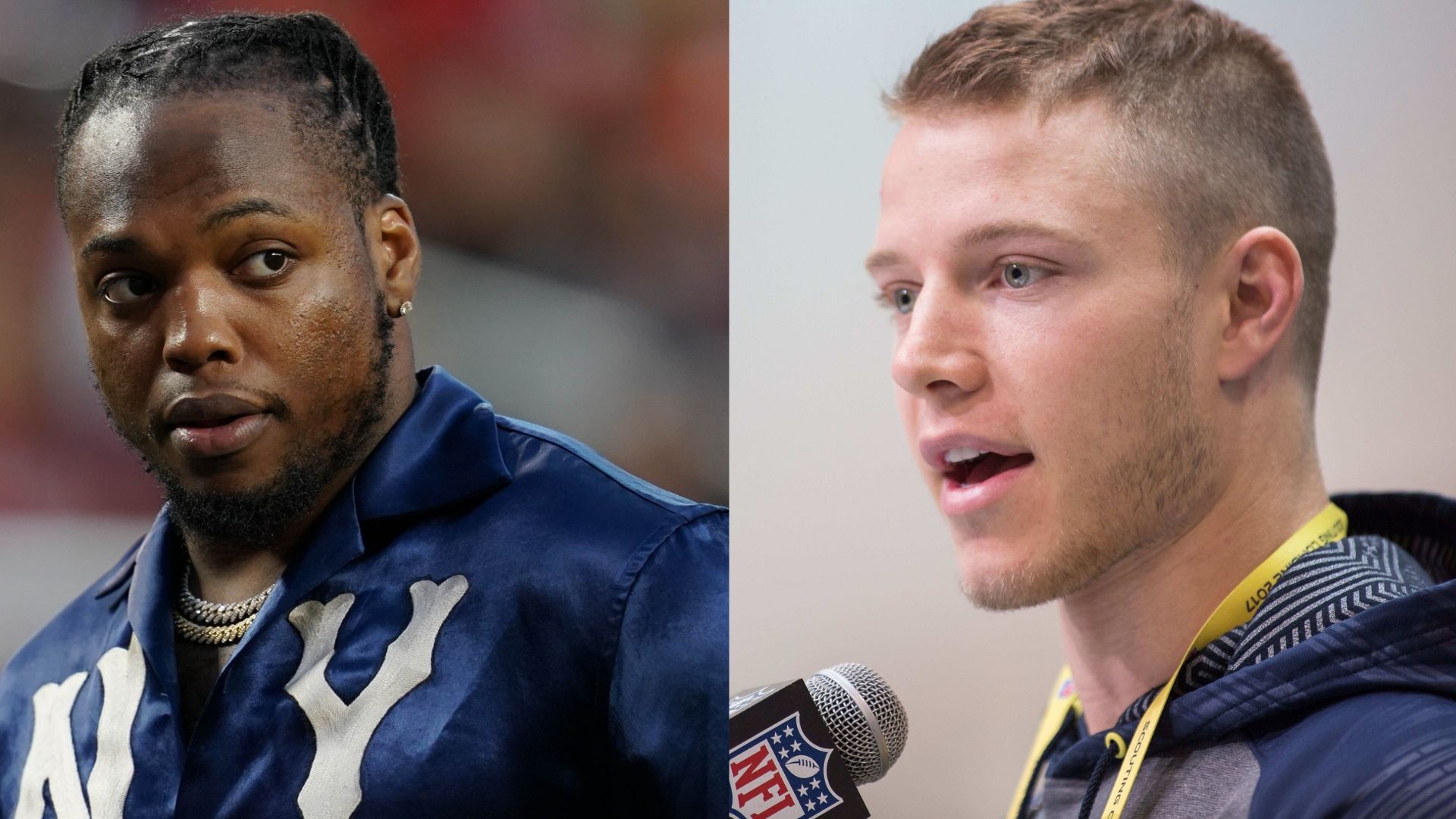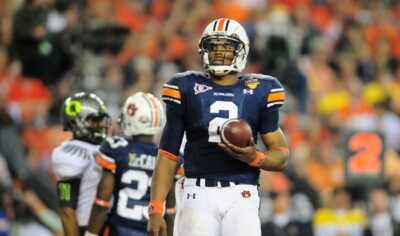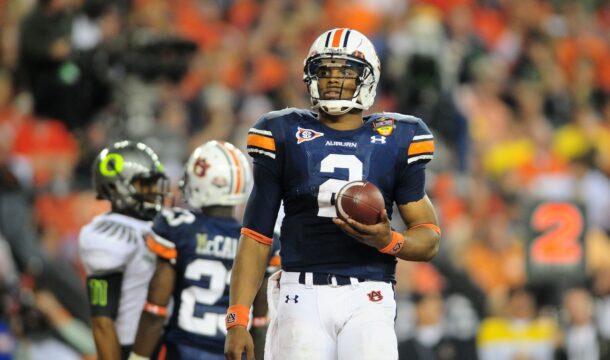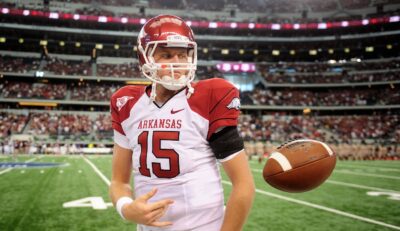
Debates Down South: Revisiting the 2015 Heisman Trophy between Derrick Henry and Christian McCaffrey
We’re gonna get through this, y’all.
We have to make adjustments, but I promise that we will get through this. Obviously we’re plenty familiar with there being no games. Shoot, 8 months out of the year lacks actual football games. From our perspective, providing you content during slow times of year is nothing new.
But given the circumstances, we decided to make some tweaks to help get you through this surreal time in our country’s history. That means on a weekly basis, I’ll take a closer look at a fascinating debate in SEC history. It could be a Heisman Trophy race, it could be comparing an accomplishment or it could just be debating whether a player or team was better. We’re also going to be doing weekly installments of this on The Saturday Down South Podcast, which you should totally subscribe to.
To kick off this new series, I dug into something that most college football fans probably remember well. That is, the 2015 Heisman Trophy race between Derrick Henry and Christian McCaffrey. Henry won, and the McCaffrey supporters voiced plenty of displeasure in the days and weeks that followed. Nationally, it still remains one of the more hotly-debated decisions that the bloated pool of Heisman voters ever had to make.
So. Let’s dig into this.
Why was/is this a debate?
There are a few reasons there was such a split decision. Henry won by just 300 total points, though he got 88 more 1st-place votes than McCaffrey did.
It was such a debate in part because they played the same position, but they did so in an entirely different way. You couldn’t just compare them by total rushing yards because McCaffrey offered far more than rushing yards. He caught 41 passes (at the time of voting) for 540 yards and 5 scores while Henry was at just 10 catches for 97 yards. Plus, McCaffrey excelled as a returner. Henry was the more physically imposing player on the superior team, and McCaffrey was the Swiss Army knife.
In the SEC Championship, Henry broke Herschel Walker’s SEC single-season rushing record. In the Pac-12 Championship, McCaffrey broke Barry Sanders’ FBS single-season all-purpose yardage record. Which accomplishment was more impressive? That depended on who you asked. There was a regional debate as well (I’ll get to more of that later). But it wasn’t like they played in the same conference and they had a bunch of common opponents.
Shoot, Heisman voters weren’t used to comparing elite running backs. The only other time in the previous 20 years that 2 running backs finished in the top 3 of the Heisman voting was when Mark Ingram edged out Toby Gerhart in a much closer 2009 race. The irony. Once again, it was an Alabama running back vs. a Stanford running back.
And just in case that wasn’t enough, the race card was played again. A white running back wasn’t unprecedented (see: Gerhart, Toby), but it certainly was atypical. Some wondered if that played a part in the public’s perception of McCaffrey, and if that impacted what we thought he was capable of.
There’s something else that I thought fueled the post-voting debate. Remember, this was voted on and announced before the bowl games were played. But what happened in a 24-hour stretch prompted anger from those who thought McCaffrey deserved to win.
Remember the 2015 Cotton Bowl? It was, for my money, the most impressive coaching game of Lane Kiffin’s career. The Alabama offensive coordinator used Henry as the decoy, and he did so masterfully. With Michigan State loading the box, Henry was held to just 75 yards on 20 carries. Meanwhile, Jake Coker benefitted off play-action passes all night and Alabama rolled past the Spartans 38-0 (that teardrop to Calvin Ridley was vastly underrated).
The very next day, McCaffrey went off against his Big Ten foe in the Rose Bowl. Like, from the jump. He took the first play from scrimmage to the house for a 75-yard touchdown catch. The guy was insane that day. McCaffrey set a Rose Bowl record with 368 (!) all-purpose yards:
For the pro-McCaffrey crowd, that was the validation they needed. Columns were written of “McCaffrey showed exactly why he should have won the Heisman with his historic Rose Bowl performance.”
That’s why the debate got new life. In a weird way, I don’t think there would have been as much discussion about this years after the fact had that the situations been reversed (McCaffrey got bottled up and Henry went off in the post-Heisman game).
What people said at the time
This was the first time since Twitter had really gotten big that there was a real Heisman debate. I remember there being a constant dissecting of takes on McCaffrey vs. Henry in a way that there hasn’t been in recent memory. It almost felt political because of the regionalization that seemed to be connected to this.
Speaking of that, let’s discuss how that played a part. There are some truths and some myths about the West Coast vs. The South debates.
One truth? McCaffrey’s games were on super late.
Of his 13 games, more than half (7) started at 10 p.m. ET or later. In fact, The Athletic reported that McCaffrey played 87% of his college snaps after 10:30 p.m. ET. It was later revealed that 1 writer even admitted to McCaffrey in 2015 that they didn’t vote for him because they couldn’t stay up late to watch his games. There was this feeling that only the diehard college football fan really appreciated McCaffrey because you had to stay up so late to watch him.
The thing that nobody really talks about with that is Stanford could have helped itself a lot more by NOT sleep-walking through that season-opener against Northwestern. By the way, McCaffrey had just 66 rushing yards that day. The Cardinal only played 1 pre-November game in East Coast primetime in part because it dug that hole for itself early in the season. Did McCaffrey take a bit longer to get the national attention? Probably.
(There was also that time when Playoff selection committee chairman Jeff Long justified Stanford’s ranking despite the ugly loss to Northwestern by citing “body clock” issues with them not being ready to play a game that started at 9 a.m. PT. Like, we should just forget a 16-6 loss because it was played really early.)
Henry, on the other hand, also was part of a September loss (to Ole Miss). Alabama, however, still played 7 of its 8 pre-November games between that prime 3:30 p.m. ET slot and 8 p.m. ET. Ironically enough, the 9 p.m. ET start against Ole Miss was the only Alabama matchup all year that didn’t fall in the traditional primetime window.
As a result, there was this need for the pro-McCaffrey crowd to make noise. Pieces came out like SB Nation’s Bill Connelly’s (now at ESPN) titled “Derrick Henry is awesome, but 3 other players deserve the Heisman more.” Connelly argued that in addition to McCaffrey, Deshaun Watson and Dalvin Cook were more worthy of the Heisman. Cook, Connelly argued, was more efficient than Henry.
It was a fair point, though it didn’t make mention of the physical toll that tackling Henry took on a team over the course of 4 quarters, which went beyond the yards per carry stat.
This, from Sports Illustrated’s Lindsay Schnell, also made the rounds. The piece was “Why Stanford’s Christian McCaffrey should win the Heisman Trophy.” The lede was what I found fascinating:
“Why #WildCaff, you wonder. Like so many before, you’ve probably fallen victim to believing the Heisman Trophy belongs to someone in the south — typically the southeast, occasionally in Southern California. But look up, north in the Golden State, and to the top of the all-purpose yardage records, and you’ll find the deserving candidate. Christian McCaffrey has been the most outstanding player in college football this season, and it’s not close.”
It was fair to argue that McCaffrey was the best player in college football. At the time of the voting, he had 2,426 yards from scrimmage compared to 2,083 from Henry (including McCaffrey’s 39 passing yards).
Here’s the thing, though. Literally the previous Heisman Trophy went to Oregon’s Marcus Mariota. He won in the biggest landslide since … Ohio State’s Troy Smith won the award in 2006 (and shouldn’t have). The overwhelming amount of voters didn’t have this mindset that “the Heisman Trophy belongs to someone in the South.”
Here’s the other thing. Usually whenever someone says “and it’s not close,” it’s almost always close. It was close. Henry breaking Walker’s record was something that mattered not just to SEC folks, but to people who remember watching Walker play and thinking that his mark would go untouched.
Again, this felt political. But just how regional was it? You can debate that was more myth than truth. Andy Staples had the state-by-state breakdown of the final votes:
Heisman votes by region. pic.twitter.com/CA70OHPYlR
— Andy Staples (@Andy_Staples) December 13, 2015
In case you couldn’t zoom in to see that, fear not. I’ve got the breakdown for you. It was:
- Far West: 333 McCaffrey, 282 Henry
- Southwest: 292 Henry, 263 McCaffrey
- Midwest: 308 Henry, 269 McCaffrey
- Northeast: 290 Henry, 234 McCaffrey
- Mid-Atlantic: 292 Henry, 231 Watson, 221 McCaffrey
- South: 368 Henry, 219 McCaffrey
To recap, McCaffrey won the Far West and Henry won the South. That’s to be expected in any close Heisman race.
So who won the other 4 regions? Henry. It this were the electoral college, it would have looked like Henry dominated this vote. Sure, the total final vote was close, but if you look at just the Southwest, Midwest, Northeast and Mid-Atlantic, Henry still held a nearly 200-point advantage.
The point is, it wasn’t like the South made up all of Henry’s votes. Had voters outside of the Far West thought McCaffrey was the best player in college football, he would have won.
So why didn’t they? Well, I’ll get to that in a minute.
The worst take you could have about this debate
There are a couple. One is more obvious than the other.
“McCaffrey would have won the Heisman if he were black.”
I beg to differ.
For starters, McCaffrey’s comp was Reggie Bush. Nothing about his style was reminiscent of Gerhart. McCaffrey wasn’t billed as this “great white hope” because his athletic ability was already at an all-world level.
If anything, I’d argue that what McCaffrey did should have allowed him to stand out. The Heisman is such a narrative-driven award. We like rewarding things we’ve never seen before. Think 2010 with Cam Newton or even 2012 with Johnny Manziel. We’ve seen bruising, freakish backs like Henry before. We’ll see more players like him again.
Have we ever seen a white college running back quite like McCaffrey? I’d argue we haven’t. He was unique, and as much as some want to say that the idea of a white running back winning the Heisman would have been “weird,” I thought the skill set defied any sort of race discussion.
Here’s another bad take.
“Henry’s volume was the only reason he won the Heisman.”
Fire up the Michael Scott GIF. “Nope, don’t like that.”
First, remember that this voting happened right after Henry had games with 46 and 44 carries to beat Auburn and Florida, respectively. Also remember that he had 339 pre-Heisman carries compared to 319 for McCaffrey (a difference of 1.5 carries per game).
I alluded to this earlier with Connelly’s piece praising Cook’s efficiency compared to Henry’s. Let me be clear. Efficiency as a runner is great. Of course you’d rather have someone who gets 8 yards per carry than 3 yards per carry. Obviously. You’d rather have the shooting guard who averages 25 points per game on 15 shots as opposed to the shooting guard who needs 32 shots to reach 25 points.
Efficiency is good. But efficiency is different at the running back position. It doesn’t account for the physical pounding that a defense takes trying to tackle a dude who is 6-3, 240 pounds and who runs a 4.5-second 40. Time and time again, Henry took over games late after wearing down a defense.
And while McCaffrey’s pass-catching ability was what made him the more efficient player in terms of yards per touch, Henry was actually the more efficient runner. At the time of the voting, Henry averaged 5.9 yards per carry compared to McCaffrey’s 5.8. In fact, compare Henry’s yards per carry (at the time of the voting) to other running backs who finished in the top 2 of the Heisman in the previous 10 years:
[table “” not found /]Why was Bush’s number so high? Well, he was ridiculously good. Nobody is debating that. He also only had 187 pre-Heisman voting carries. Was he more efficient than Henry? Absolutely. But to be like “well, Bush was better than Herschel Walker because Bush averaged 8.9 yards per carry compared to Walker’s 5.3” would totally lack context.
Here’s the other thing. Was Henry the home-run threat that McCaffrey was? No, but the guy still had 4 pre-Heisman games with a run of 40-plus yards. He was, by no means, 3 yards and a cloud of dust.
Thing I forgot/didn’t know until researching this
I wanted to point out a couple of things here. One is the volume of McCaffrey’s workload. I touched on it in the previous section, but including returns, he had 434 total touches in 2015. That’s absolutely insane. It’s actually more than the 406 that Henry had, and he had an extra game. I forgot that McCaffrey had 7 games with 25-plus carries and he had 7 games with 30-plus total touches.
The other thing I didn’t know at the time was how they fared against top-20 defenses. Remember, this is all pre-Heisman stuff here:
[table “” not found /]It probably helped that Henry’s teams went 4-0 in those games with an average of 30 points compared to McCaffrey’s Stanford team going 1-1 with an average of 18.5 points.
That leads me to my final point.
So, which side of the debate am I on?
Henry’s.
I know what you’re going to say. “Of course you’d say that on an SEC football website. You probably don’t remember how good McCaffrey was.” Believe me. I do. I came into this debate actually trying to talk myself into McCaffrey. Watching some of his old clips, I can confirm that he was one of the best college players at any position of the 21st century.
The key thing to remember here is that what happened in the Rose Bowl is not a part of this debate because it happened after the voting. Could it have swayed the minds of some who gave Henry the nod? Perhaps. But the problem I have is then what about when Henry had 36 carries for 158 yards and 3 touchdowns to beat Clemson in the national championship? Does that not matter to the pro-McCaffrey crowd? It should.
I also think too many people want to pretend that all yards and competition are equal when it comes to looking at Henry and McCaffrey. That doesn’t seem fair considering Henry played 4 top-20 defenses compared to 2 for McCaffrey and Henry faced 7 ranked opponents (pre-Heisman) compared to 4 for McCaffrey.
To me, McCaffrey needed to have a more significant statistical advantage on Henry to win the award. In yards from scrimmage, McCaffrey only averaged 26 more per game than Henry. Touchdowns aren’t everything, but Henry did have McCaffrey beat 23-16 (23-8 in rushing scores), and that’s including McCaffrey’s 2 passing touchdowns and 2 return scores.
What Henry did to put Alabama on his back in those defining games was special.
In a 5-week stretch after the Ole Miss loss, Alabama went on the road to face top-10 teams twice with essentially the season on the line. In those games, Henry averaged 29 carries for 192 yards. Who could forget the massive showdown he had with Leonard Fournette? With all the hype surrounding Fournette, Henry out-rushed him 210-31 in what turned out to be a “Heisman moment.” There was also the 46-carry, 271-yard performance in the Iron Bowl, and with Playoff hopes on the line in the SEC Championship, all Henry did was tote the rock 44 times for 189 yards in a win.
He was a monster. He was clutch. I didn’t even mention the game-winning touchdown he had with 2 minutes left to beat Tennessee.
But Henry’s brilliance was somewhat subdued because it was an Alabama running back. There was the “Bama running backs are busts” narrative out there, and there was a belief that Henry wasn’t special enough to win the award. It felt like there was a belief that it was “lazy” to say that he was the best player in college football, and not McCaffrey.
That, in my opinion, is totally discrediting one of the more impressive seasons we’ve ever seen from a running back at the Power 5 level. Few human beings could have handled that workload and been as dominant as Henry was.
McCaffrey was indeed more of the “highlight-reel player,” and you could make a good case that he was more appointment viewing than Henry. That’s totally fine. If he’s your Heisman, I have no problem with you.
But if you say “and it’s not close,” well, I’ve got a little problem with you.
Connor O'Gara is the senior national columnist for Saturday Down South. He's a member of the Football Writers Association of America. After spending his entire life living in B1G country, he moved to the South in 2015.







